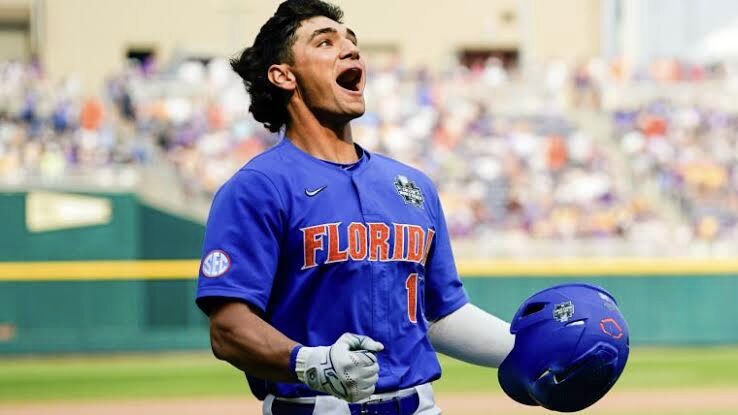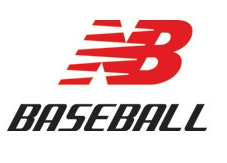Building out a draft board is a complicated exercise. Our process involves meticulous detail in batted-ball data evaluation, switch decision tracking, pitch metrics, athletic testing and one-on-one interactions with the players as we work to get a feel for their makeup. We attend tournaments, showcases, scrimmages and games to watch the players in their element. The whole process is complimented by extensive conversations with scouting directors, analysts, cross-checkers and area scouts to double-check our evaluations with differing opinions to help draw more conclusive ideas.
EDITOR’S NOTE: The following rankings and evaluations by FSS PLUS are based on subjective analysis and industry sources, and do not influence, are not influenced by, or are affiliated with the opinions and reports of Future Stars Series scouting and development staff.
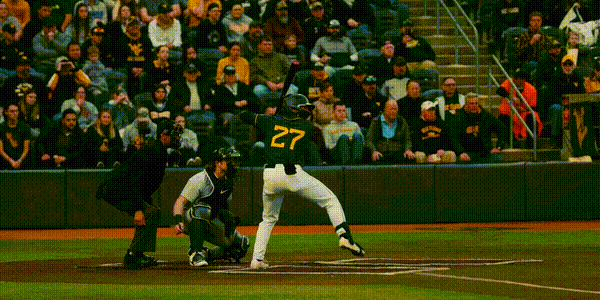
1. JJ Wetherholt, 2B/3B — West Virginia
HOMETOWN: Gibsonia, PA
HEIGHT: 5-10
WEIGHT: 190
BAT/THROW: L-R
DRAFT SPOTLIGHT INTERVIEW: Watch video
Wetherholt, a thick, strong-bodied infielder, has positional versatility, though most consider him a second- or third baseman in the long-term. He’ll get plenty of run at shortstop for the Mountaineers in 2024, though most scouts don’t project it his future home. It’s average arm strength and he’s sure-handed. Wetherholt can handle the routine expectations anywhere on the dirt, albeit lacking the athletic tools to make the sensational play.
The bat is exceedingly impressive here. Wetherholt can really hit with double-plus bat-to-ball skills and a willingness to go gap-to-gap and stay away from the pull-heavy approach that gets so many lefty bats in trouble. The hand speed is exceptional with a barrel that stays through the zone a long time. There’s some steepness to Wetherholt’s swing that provides natural game power. The power and bat speed here are real, comfortably plus with barrel awareness few of his peers can match. Wetherholt consistently hits the ball hard more than just about anyone in the country. On top of his tools in the batters box, Wetherholt is also an above average runner who gets strong jumps on the base paths. He’s an aggressive, high-IQ player who figures to steal plenty of bags at the next level. While Wetherholt lacks much physical projection, his current level of play is representative of a player who could go No. 1 overall in any given draft regardless of physical upside.

2. Nick Kurtz, 1B — Wake Forest
HOMETOWN: Lancaster, PA
HEIGHT: 6-5
WEIGHT: 235
BAT/THROW: L-L
DRAFT SPOTLIGHT INTERVIEW: Watch video
Kurtz burst onto the scene as a true freshman posting some of the most impressive batted-ball and swing-decision metrics of anyone during the 2022 college baseball season. Those metrics carried over to the 2023 season as Kurtz proved himself one of the most feared hitters in the sport.
Some evaluators believe Kurtz may be the best power hitter in the 2024 class, and that’s saying a lot considering some of the names he’s mentioned alongside. It’s absolutely mammoth bat speed and buggy hips from the left side. It’s every bit that of double-plus juice. Kurtz possesses above average bat-to-ball skills with an elite eye at the plate, hardly every expanding the zone. He’s the prototype middle-of-the-order slugger.
Kurtz is an average runner underway with solid baseball instincts and the ability to impact the game on the base paths if you don’t pay attention to him. He’s a solid average glove at first base and can get by as something close to a fringy left fielder, though scouts prefer he stay on the dirt for durability’s sake. Kurtz has a chance to anchor a big league lineup for a long, long time. He reminds some of Jim Thome.

3. Travis Bazzana, 2B — Oregon State
HOMETOWN: Sydney, Australia
HEIGHT: 6-0
WEIGHT: 190
BAT/THROW: L-R
DRAFT SPOTLIGHT INTERVIEW: Watch video
You’d be hard-pressed to find a prospect with a better combination of pure hit tool, approach, and peak exit velocities than Travis Bazzana. An import out of Australia, Bazzana possesses plus bat-to-ball skills to go alongside his elite eye. He refuses to expand the zone and has shown a willingness to all fields. He’s also about as good as they come in terms of pummeling balls left in the strike zone. He’s one of the more decorated hitters in college baseball in terms of fighting off pitches just off the black. A brutally difficult at-bat for opposing pitchers. Bazzana has flashed plus raw power, and he’s getting to a lot of it in games. If there’s one nitpick scouts would like to see improve as the draft approaches, it’s his polish against left-handed pitching. Bazzana annhilites righties, but his swing rates and chase rates both jump a bit against southpaws, and his exit velocities take a dip as well.
An import out of Sydney, Bazzana was a star in the Pac-12 immediately as a true freshman. The Aussie has twitch and bounce on the dirt with an average arm and enough athleticism to make the plays to his right and left. Some scouts want to see what it looks like over an extended period at shortstop, but that opportunity has yet to truly present itself. He projects a potential plus hitter with above-average power at the next level, all while playing a steady, if not exceptional second base. He also figures to steal upwards of 20-or-more bags per season at the next level as his high IQ and above average speed should both impact the game immediately on the base paths.
Perhaps Bazzana’s greatest strength however is tireless pursuit of perfection and improvement in his game. He’s an analytic mind who welcomes developing his game through tangible numbers and data evaluation. The kid grinds. His approach toward the game is already well-suited for the next level, and many believe his game should translate quickly to professional ball. He’s got a shot at developing into someone like Jason Kipnis at the next level.

4. Charlie Condon, OF — Georgia
HOMETOWN: Marietta, GA
HEIGHT: 6-5
WEIGHT: 205
BAT/THROW: R-R
DRAFT SPOTLIGHT INTERVIEW: Watch video
Condon’s emergence for the Bulldogs in 2023 came as a bit of a surprise to the college baseball world after the long, lanky outfielder redshirted in 2022 to add weight and work on his swing. It’s a similar player-arch to former Florida outfielder Wyatt Langford, and Condon could be following in his footsteps. Condon broke through as the regular left fielder for the Bulldogs and immediately provided impact with the bat. He’s got big raw power and a hit tool that is more advanced for his age than previously thought coming out of high school. The swing can get a little long at times, and there’s some questions on his ability to make enough contact on pitches outside of the strike zone to be a truly consistent pure hitter at the next level, but few doubt the impact in the overall offensive profile.
Condon has received mixed reviews on his defensive ability, though just about everyone who’s laid eyes on him this spring agrees the glove has taken a step in the right direction. He’s moving better than he once did, and the arm strength is plenty strong enough to warrant consideration in a corner as a pro.
Condon has the makings of a right-right power-hitting outfielder or first baseman. If the swing-and-miss can shrink just a bit from where it was a year ago as July approaches, Condon has Top-5 pick upside and looks the part of a bat who could move quickly at the next level.
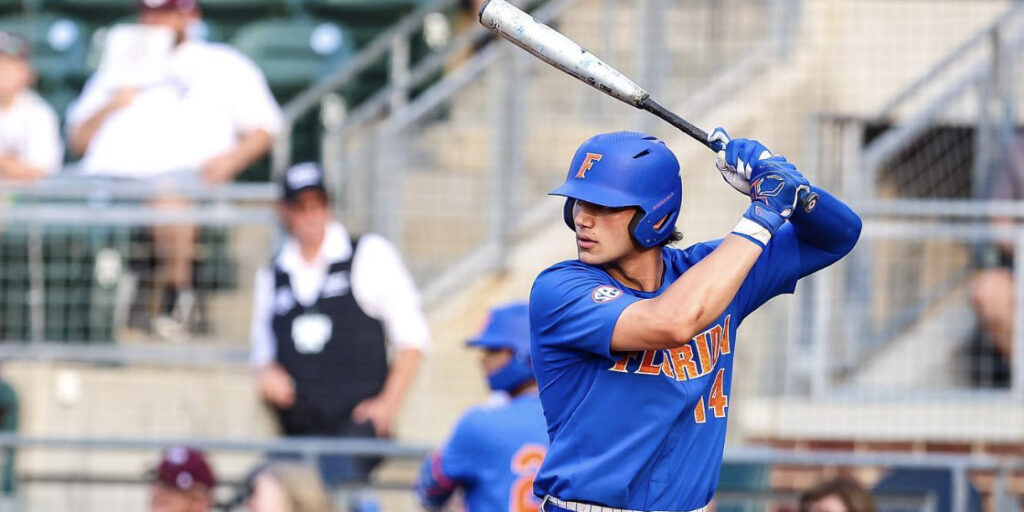
5. Jac Caglianone, 1B/LHP — Florida
HOMETOWN: Tampa, FL
HEIGHT: 6-5
WEIGHT: 210
BAT/THROW: L-L
DRAFT SPOTLIGHT INTERVIEW: Watch video
Caglianone is possibly the most decorated and talented two-way player college baseball has seen in a very long time. Offensively he possesses immense hand and bat speed allowing the 6-foot-5-inch lefty to get into double-plus raw power. Most scouts see average bat-to-ball skills here, but Caglianone can get anxious at the plate and expand the zone at an unhealthy clip at times. That said, he’s shown the ability to battle off pitches outside of the strike zone. Still, that’ll need to iron itself out if he hopes to reach his middle-of-the-order upside offensively. Caglianone is an average runner and is likely destined for first base as a pro, but this is an impact bat with 40-home run upside if it matures.
On the mound, he’s been up to 101 in side sessions and 99 in games and will flash an above average slider that’s really come on of late. There’s also a changeup, though it lags a bit behind his primary two-pitch mix. Caglianone is a legitimate pitching prospect with no. 3 upside, though there is a bit of reliever risk due to command concerns and his ability to repeat his operation deep into starts. He worked hard over the past 12 months to shorten his arm action and tighten up his elbow spiral, and that seems to have paid dividends in his ability to control the ball. He’s still very young and has plenty of time to shore up the polish and consistency of those mechanical necessities.
There are a multitude of avenues Caglianone can take to become a valuable and productive big leaguer. Which route he’ll choose, and which route scouts prefer for that matter, is yet to be determined.
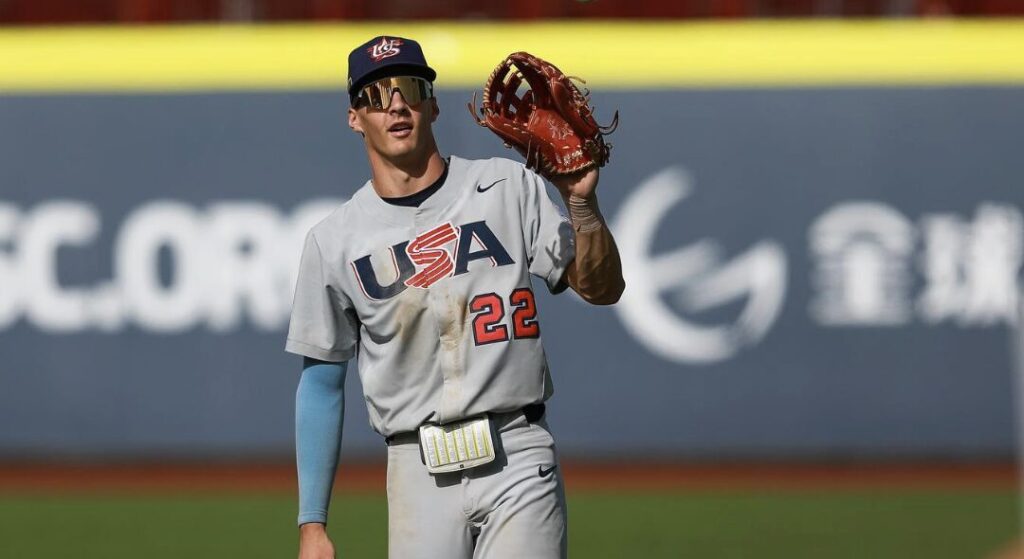
6. Konnor Griffin, OF/RHP — Jackson Prep
HOMETOWN: Florence, LA
HEIGHT: 6-4
WEIGHT: 200
BAT/THROW: R-R
COMMITMENT: LSU
DRAFT SPOTLIGHT INTERVIEW: Watch video
Considering the size and physicality of Konnor Griffin, it’s incredible to think he’ll barely be 18 years old on draft day. Griffin reclassified out of the 2025 draft class after overmatching his peers. He has the frame scouts dream on, a long, levered body with projectable strength and present athleticism. The upside here is tremendous. Griffin plays shortstop and centerfield now, but most think he projects best in the grass where his plus speed and rangy routes will play best. He’s got a strong throwing arm and the twitch necessary to make a good first step. He has every chance to stick on the dirt, but the hands are probably solid average and there’s a high likelihood he’ll grow off the position. He could probably be an above average defender at either spot. He’s also comfortably a plus runner with a long stride and speed that should hold well as his body further matures.
Already an accomplished slugger, Griffin has considerable bat speed with over-the-fence juice and should grow into 60-grade game power. Scouts would like to see the hit tool show more consistency in-game, but he’s shown flashes of polish and strong swing decisions. The bat got better as the summer went on last year, and there’s a large swatch of the industry who believes he has the chops to hit as a full-time player at the next level. Griffin is a swing-tinkerer. As he settles into a pro routine, the results should follow. Getting the barrel to the ball and avoiding weak contact will be the next checkpoint in Griffin’s offensive development. If it all clicks, Griffin has 5-tool upside.
It’s not totally a foregone conclusion that he’s a position player either. Griffin has been up to 97 on the mound with a put-away slider. He’s a tremendous mover and some liken his profile on the bump to what Jack Flaherty was at this same stage. Because of that ceiling, some scouts actually prefer him on the mound. There’s two-way upside here and whoever drafts Griffin may elect to let him do both while they figure out his most productive avenue going forward.
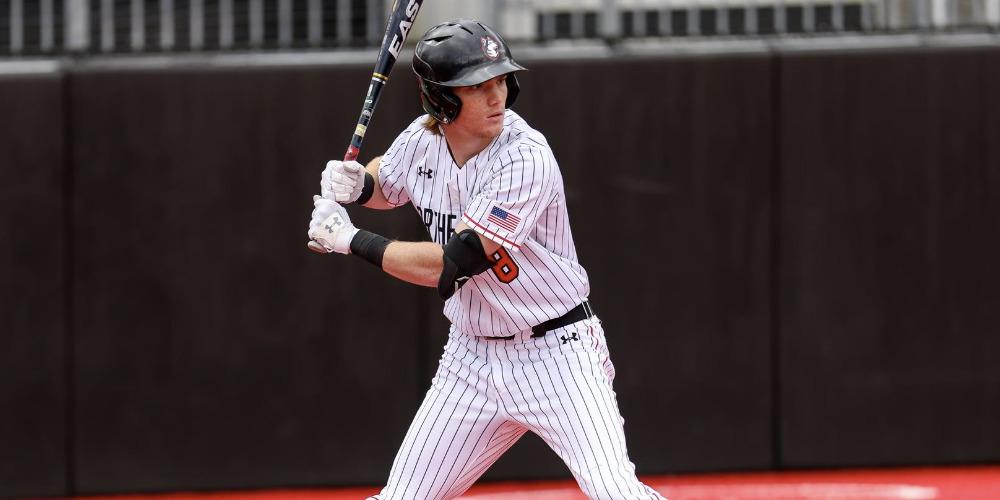
7. Mike Sirota, OF — Northeastern
HOMETOWN: Queens, NY
HEIGHT: 6-3
WEIGHT: 188
BAT/THROW: R-R
DRAFT SPOTLIGHT INTERVIEW: Watch video
Sirota is a super-impressive all-around athlete with the ability to impact the game in a number of areas. The approach at the plate is second-to-none, producing elite-level chase rates. Few scouts can poke holes in his swing; a short, quiet, compact, explosive cut that stays through the zone for an extended period. He handles velocity better than almost all of his peers and projects to hit for average and a high on-base as a professional. Scouts would like to see his ability to handle spin a bit better as the draft approaches, but his struggles aren’t to the level of red-flag worthy; it’s just not a strength at this stage. There’s above average raw power here too. Sirota could flirt with 20-homer seasons if his development stays linear.
It’s the athletic traits that really push Sirota up boards. He is a plus centerfield defender with plus run times and impressive route running ability; all signs pointing toward a future big league centerfield profile. Sirota has twitchy hips and a ton of bounce to his game with scouts eager to see what’s to come. There’s a little bit of AJ Pollock in this profile. Nothing terribly flashy or “plus”, but a sum-of-his-parts really, really solid producer and impact player.
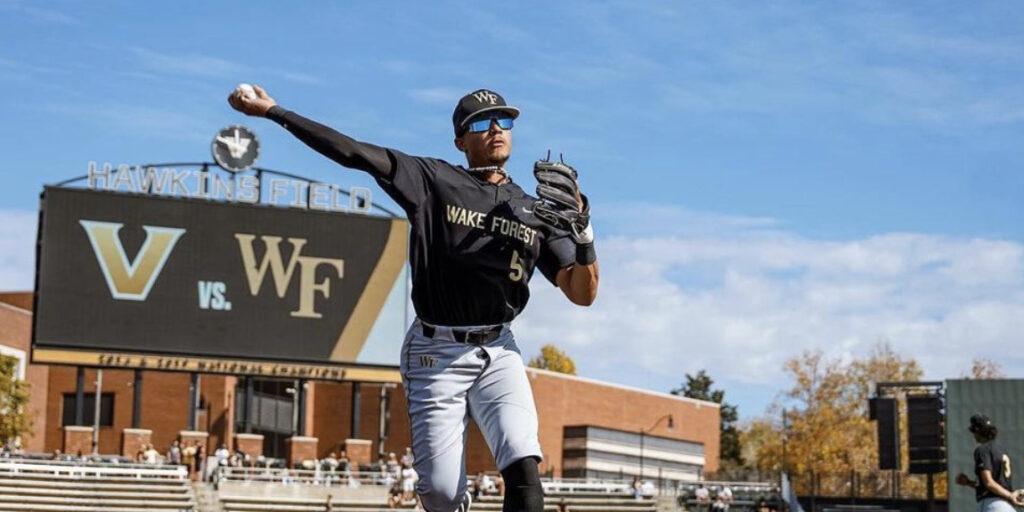
8. Seaver King, OF/2B — Wake Forest
HOMETOWN: Athens, GA
HEIGHT: 6-0
WEIGHT: 190
BAT/THROW: R-R
DRAFT SPOTLIGHT INTERVIEW: Watch video
King was a metric monster in 2023 posting gaudy exit velocity numbers on his way to a .411/.457/.699 slash with eleven homers. While there is slight concern inside the scouting community on high chase rates King posted during the wood-bat summer with Team USA and on the Cape, he did make up for his eager approach by making a ton of contact, and it was to all fields and extremely loud. He can get away with swinging at pitches outside the zone at times, and fights to get back to a point where he can kill a cookie mistake.
King has enough twitch and athleticism to handle shortstop, though most believe his throwing arm will push him to second base or centerfield at the next level. He’s a plus runner who should be an asset on the base paths.
So long as King’s approach doesn’t derail what he’s physically capable of doing on the field, his assortment of above-average to plus tools should show out in a big way at the next level.
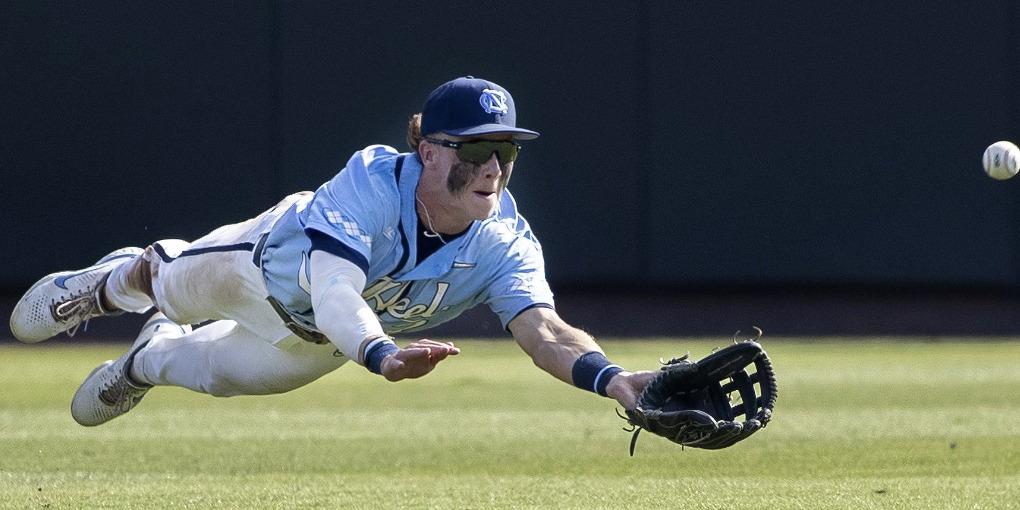
9. Vance Honeycutt, OF — North Carolina
HOMETOWN: Salisbury, NC
HEIGHT: 6-3
WEIGHT: 205
BAT/THROW: R-R
DRAFT SPOTLIGHT INTERVIEW: Watch video
Honeycutt has a chance to become a rare five-tool player at the next level. He’s long and projectable with serious upwards trajectory in his game. Honeycutt possesses plus raw power and a swing path built to capitalize on all of it. The hit tool has taken major strides from his freshman year as he’s really cut down the swing and miss, subsequently shrinking his strikeout rates too. Honeycutt saw his chase rate absolutely plummet. He now resembles a more polished, patient hitter who can damage mistakes over the plate. For now, it’s solid average bat-to-ball skills with plus raw power and burgeoning use of it in-game. He’ll have to prove he can fend off good pitches on the black as the draft approaches, as well as cut down his overall strikeout rate to capitalize on his Top-10 pick upside.
Honeycutt is a plus, potentially double-plus runner who plays plus defense in centerfield. As long as he doesn’t outgrow the middle of the field, he projects to stay at the “8”. This is a guy with 20-20 upside and a walking highlight reel with a glove in his hand.
There are some durability concerns that also surround Honeycutt’s profile, and that’s something teams will want clarification on going forward. Playing a full season in 2024 would certainly help answer those questions. At the end of the day, if nothing changes between now and July, there’s something of a Drew Stubbs projection here. Stubbs, the No. 8 overall pick by the Reds in 2006 played nine years in the big leagues providing exceptional defense. As a full-time player he averaged 15 home runs per season and added 25 steals despite struggling against right-handed pitching.
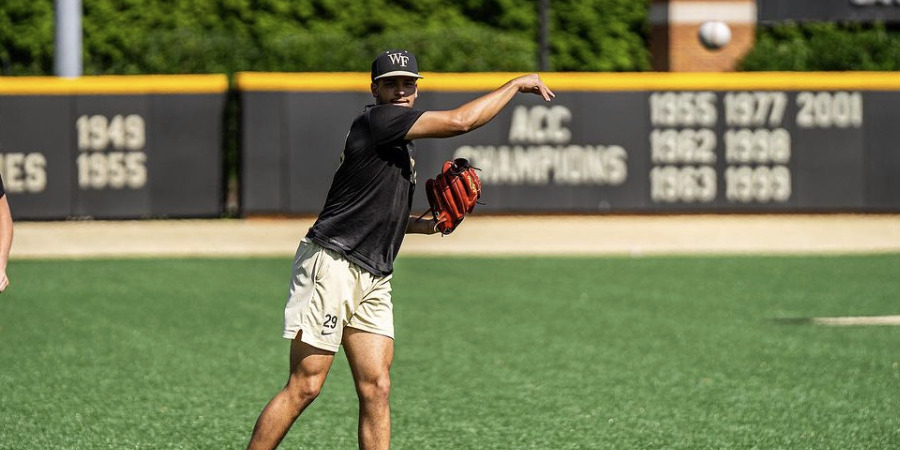
10. Chase Burns, RHP — Wake Forest
HOMETOWN: Gallatin, TN
HEIGHT: 6-4
WEIGHT: 215
DRAFT SPOTLIGHT INTERVIEW: Watch video
Burns has long been on the radar of scouts going back to his days as a bluechip prep in 2021. Primarily a two-pitch guy to this point, Burns offers a mid-to-upper 90s fastball that’s touched 101 and figures to continue tickling triple digits as he matures. Burns’ slider is thrown hard and firm, up to 91, sitting 85-87 with two-plane tilt; more depth than sweep. Burns’ spin rates are high, and he’s got a track record of commanding the baseball and overpowering the opposition. There’s a seldom-used changeup in his arsenal, though it’s inconsistent and Burns struggles to command it on a start-by-start basis. There’s also a bigger curveball in there, and he’s begun to deploy it a bit more of late. It’s got teeth, but is often uncompetitive. As he starts working in feel for his curveball and changeup, the arsenal should begin to overwhelm hitters at an even greater clip.
Burns spent the first two years in college at Tennessee before transferring to Wake Forest for 2024. He rotated between a rotation role and a high leverage bullpen role. If he’s to capture his Top-10 pick ceiling, he’ll need to establish the durability and workload expectations scouts want to see on a guy who will need to pitch every fifth day and go upwards of 90 pitches at at time. The Wake Forest pitching lab should give him a leg up in understanding pitch design and how the art of the sport translates to the next level. This includes improving his overall pitchability and strategy toward going deeper into ballgames with his elite stuff. Burns simply looks like a big league arm and with added consistency could be the first arm off the board.
MORE 2024 COVERAGE: Mock Draft 1.0
- The Diamondbacks return for Josh Naylor… - July 25, 2025
- Five 2025 draft picks that could win Rookie of the Year in 2026 - July 21, 2025
- 2025 MLB Draft: The predictions you didn’t know you needed - July 16, 2025

